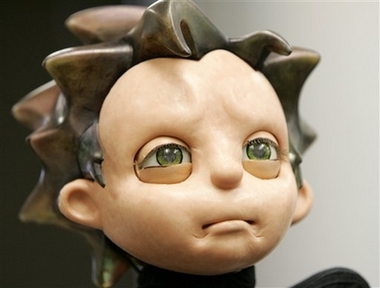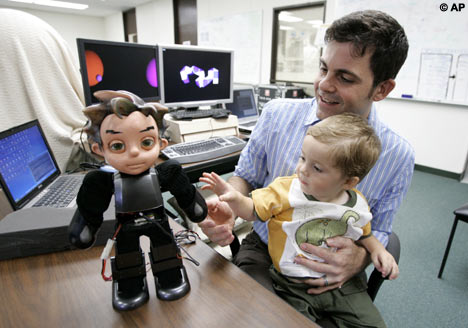Science Fiction
Dictionary
A B C D E F G H I J K L M N O P Q R S T U V W X Y Z
Roboticist Has Real Son Zeno, Robot Son Zeno

In science fiction writer Brian Aldiss' 1969 story Super-Toys Last All Summer Long, roboticist Henry Swinton and his wife are not allowed to have a child, due to overpopulation. So, Henry creates David, a synthetic boy named David. By the end of the story, though, Henry and his wife win the parenthood lottery, and will have a real son along with a robotic one.
Roboticist David Hanson can relate to this story. He has two little boys named Zeno in his house. An eighteen-month-old little boy and a little robotic boy.

(Zeno the robot boy)
Zeno (the robot son) is about 17 inches tall and weighs 6 pounds. Hanson and a team of roboticists at his company, Hanson Robotics, worked for five years to create Zeno. The robot boy, that is.
"It's a representation of robotics as a character animation medium, one that is intelligent," Hanson beams. "It sees you and recognizes your face. It learns your name and can build a relationship with you.""...by coincidence they're both Zeno, and in other ways this robot has become more of a portrait sculpturally of the son, although it's almost coincidence," said Hanson, whose previous jobs include working as a character sculptor for The Walt Disney Co. "We didn't consciously sculpt this robot to look like him. It's the way things filter through the hands of the artist."
Zeno (the robot boy) confers wirelessly with the brains behind the machine - a PC running a variant of Massive Software, which enabled the graphics for the battle scenes in Lord of the Rings.

(Zeno robot boy, David Hanson, Zeno)
I met David Hanson briefly at NextFest 2005 (see NextFest 2005 - Festival Of Technovelgy to see some of its still sfnal devices), which was held in Chicago. He was introducing his Philip K. Dick robot, and seemed like a very nice, very well-grounded guy. He'd like to get the price on his robot boy down to the point where most people could afford one. A robot boy.
Via Robot Maker Builds Artificial Boy; thanks to Zac Hunter for finding this eerily-close-to-science-fictional story.
Scroll down for more stories in the same category. (Story submitted 9/14/2007)
Follow this kind of news @Technovelgy.| Email | RSS | Blog It | Stumble | del.icio.us | Digg | Reddit |
Would
you like to contribute a story tip?
It's easy:
Get the URL of the story, and the related sf author, and add
it here.
Comment/Join discussion ( 0 )
Related News Stories - (" Robotics ")
Atlas Robot Makes Uncomfortable Movements
'Not like me. A T-1000, advanced prototype. A mimetic poly-alloy. Liquid metal.' - James Cameron, 1991.
Humanoid Robots Tickle The Ivories
'The massive feet working the pedals, arms and hands flashing and glinting...' - Herbert Goldstone, 1953.
Golf Ball Test Robot Wears Them Out
"The robot solemnly hit a ball against the wall, picked it up and teed it, hit it again, over and again...' - Frederik Poh, 1954.
PaXini Supersensitive Robot Fingers
'My fingers are not that sensitive...' - Ray Cummings, 1931.
Technovelgy (that's tech-novel-gee!) is devoted to the creative science inventions and ideas of sf authors. Look for the Invention Category that interests you, the Glossary, the Invention Timeline, or see what's New.
Science Fiction
Timeline
1600-1899
1900-1939
1940's 1950's
1960's 1970's
1980's 1990's
2000's 2010's
Current News
The New Habitable Zones Include Asimov's Ribbon Worlds
'...there's a narrow belt where the climate is moderate.'
Can One Robot Do Many Tasks?
'... with the Master-operator all you have to do is push one! A remarkable achievement!'
Atlas Robot Makes Uncomfortable Movements
'Not like me. A T-1000, advanced prototype. A mimetic poly-alloy. Liquid metal.'
Boring Company Drills Asimov's Single Vehicle Tunnels
'It was riddled with holes that were the mouths of tunnels.'
Humanoid Robots Tickle The Ivories
'The massive feet working the pedals, arms and hands flashing and glinting...'
A Remarkable Coincidence
'There is a philosophical problem of some difficulty here...'
Cortex 1 - Today A Warehouse, Tomorrow A Calculator Planet
'There were cubic miles of it, and it glistened like a silvery Christmas tree...'
Perching Ambush Drones
'On the chest of drawers something was perched.'
Leader-Follower Autonomous Vehicle Technology
'Jason had been guiding the caravan of cars as usual...'
Golf Ball Test Robot Wears Them Out
"The robot solemnly hit a ball against the wall, picked it up and teed it, hit it again, over and again...'
Boring Company Vegas Loop Like Asimov Said
'There was a wall ahead... It was riddled with holes that were the mouths of tunnels.'
Rigid Metallic Clothing From Science Fiction To You
'...support the interior human structure against Jupiterís pull.'
Is The Seattle Ultrasonics C-200 A Heinlein Vibroblade?
'It ain't a vibroblade. It's steel. Messy.'
Roborock Saros Z70 Is A Robot Vacuum With An Arm
'Anything larger than a BB shot it picked up and placed in a tray...'
A Beautiful Visualization Of Compact Food
'The German chemists have discovered how to supply the needed elements in compact, undiluted form...'
Bone-Building Drug Evenity Approved
'Compounds devised by the biochemists for the rapid building of bone...'
